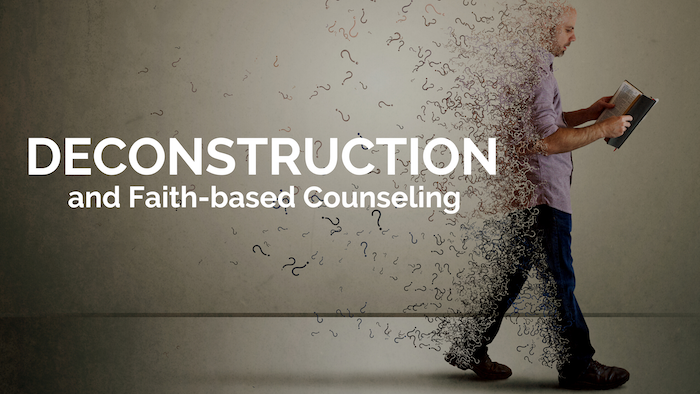A Course for Counselors and Therapists on Helping Clients
Navigate Faith Transition Professionally and Ethically
Navigate Faith Transition Professionally and Ethically

Why This Course?
Many counselors who provide faith-based counseling have been trained in graduate and continuing education programs that integrate mostly evangelical Christian doctrine and beliefs.
In recent years, within evangelicalism has emerged the “deconstruction movement” where many are deconstructing their faith — whether that means simply questioning their beliefs, leaving Christianity (or leaving spirituality and religion altogether), or becoming spiritual-but-not religious.
Many counselors who provide faith-based counseling have been trained in graduate and continuing education programs that integrate mostly evangelical Christian doctrine and beliefs.
In recent years, within evangelicalism has emerged the “deconstruction movement” where many are deconstructing their faith — whether that means simply questioning their beliefs, leaving Christianity (or leaving spirituality and religion altogether), or becoming spiritual-but-not religious.
Challenges to Faith-Based Counseling
- How can faith-based counselors work with those who are deconstructing in therapy — especially if they have only been trained through the lens of a Christian integration model?
- What if doing so brings distress to a counselor who still wants to hold to their own faith tradition without violating their own beliefs?
- We talk about ways that counselors can approach this issue ethically and effectively through insight from the field of pastoral counseling and spiritual direction.

What This Course is Not
This course is not a theological, biblical, or apologetics response to the deconstruction movement. It is not meant to be evangelistic nor does it intend to re-convert those who have left their faith or coerce those who are questioning their faith.
This course is primarily for counselors and is meant to help clients who are deconstructing receive care that is client-centered, ethical, sensitive, and trauma-informed. This material may also be applicable to clergy, chaplains, and spiritual care professionals who want to learn more on how to ethically care for those who are deconstructing.
This course is not a theological, biblical, or apologetics response to the deconstruction movement. It is not meant to be evangelistic nor does it intend to re-convert those who have left their faith or coerce those who are questioning their faith.
This course is primarily for counselors and is meant to help clients who are deconstructing receive care that is client-centered, ethical, sensitive, and trauma-informed. This material may also be applicable to clergy, chaplains, and spiritual care professionals who want to learn more on how to ethically care for those who are deconstructing.

What is Included?
This course gives a primer to the issue of deconstruction and how those dynamics affect the client, their family, and their process in therapy. It is meant to be a jumping-off point that provides introductory material on this topic but recommends additional resources for further study. The course includes:
This course gives a primer to the issue of deconstruction and how those dynamics affect the client, their family, and their process in therapy. It is meant to be a jumping-off point that provides introductory material on this topic but recommends additional resources for further study. The course includes:
- 30 videos (90 minutes total) of lecture material that can be viewed at your own pace
- Detailed notes with each lecture
- Online discussion in the comments with the instructor and other students
- Recommended resources for further study
- Lifetime access so you can return to access the course whenever needed
- Certificate of completion for (1.5 hours)--be sure to check with your licensing board to see if continuing education in pastoral counseling will qualify toward any requirements
Curriculum Overview
|
Introduction
The Family
|
The Client
The Counselor
|


